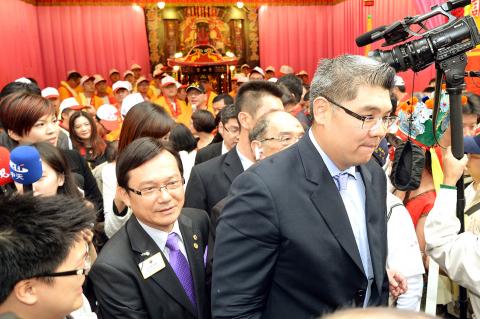Former Taipei EasyCard Corp chairman Sean Lien (連勝文) yesterday remained tight-lipped about his bid for the Taipei mayoral election, while a new poll showed that National Taiwan University’s Department of Traumatology director Ko Wen-je (柯文哲) would obtain more support than Lien if he joined the race.
The poll, conducted by Trend Survey & Research Co on Oct. 31, showed that 39.1 percent of respondents said they would support the independent Ko in the Taipei mayoral election if he were a candidate, while support for Lien, as the KMT representative, would be 33.5 percent.
Lien, son of former Chinese Nationalist Party (KMT) chairman Lien Chan (連戰), has been the most popular contender in the pan-blue camp to represent the KMT in the race. He declined to confirm his bid yesterday and said there are issues to consider before making his decision.

Photo: CNA
“If I were to think of my own interests, I would stay away from [the election]. Anyone who wants to live happily should not participate in politics. However, if I want to make a contribution to society, I need to consider carefully if I can contribute to society and how I can do so,” he said yesterday after delivering a speech at Shih Hsin University.
Lien has reportedly been unable to make up his mind due to health reasons and a shooting incident in 2010, in which he was shot in the cheek during election campaign activities in New Taipei City (新北市).
He has said that his family opposes his involvement in politics following the incident and acknowledged that his personal safety is his main concern.
Lien shrugged off the poll result and dismissed rumors that he would be Legislative Speaker Wang Jin-pyng’s (王金平) running mate in the 2016 presidential election.
“This is an amusing question — [The rumor] was spread by an individual to a specific media outlet,” he said.
In another poll conducted among hopefuls in the pan-green camp, Ko, an independent, won a support rating of 39.1 percent. Support for former vice president Annette Lu (呂秀蓮) was 17.2 percent and lawyer Wellington Koo (顧立雄) had 9.8 percent.
Lu yesterday dismissed the poll result and said she would strive for victory in the election.

The inspection equipment and data transmission system for new robotic dogs that Taipei is planning to use for sidewalk patrols were developed by a Taiwanese company, the city’s New Construction Office said today, dismissing concerns that the China-made robots could pose a security risk. The city is bringing in smart robotic dogs to help with sidewalk inspections, Taipei Deputy Mayor Lee Ssu-chuan (李四川) said on Facebook. Equipped with a panoramic surveillance system, the robots would be able to automatically flag problems and easily navigate narrow sidewalks, making inspections faster and more accurate, Lee said. By collecting more accurate data, they would help Taipei

TAKING STOCK: The USMC is rebuilding a once-abandoned airfield in Palau to support large-scale ground operations as China’s missile range grows, Naval News reported The US Marine Corps (USMC) is considering new sites for stockpiling equipment in the West Pacific to harden military supply chains and enhance mobility across the Indo-Pacific region, US-based Naval News reported on Saturday. The proposed sites in Palau — one of Taiwan’s diplomatic allies — and Australia would enable a “rapid standup of stored equipment within a year” of the program’s approval, the report said, citing documents published by the USMC last month. In Palau, the service is rebuilding a formerly abandoned World War II-era airfield and establishing ancillary structures to support large-scale ground operations “as China’s missile range and magazine

A 72-year-old man in Kaohsiung was sentenced to 40 days in jail after he was found having sex with a 67-year-old woman under a slide in a public park on Sunday afternoon. At 3pm on Sunday, a mother surnamed Liang (梁) was with her child at a neighborhood park when they found the man, surnamed Tsai (蔡), and woman, surnamed Huang (黃), underneath the slide. Liang took her child away from the scene, took photographs of the two and called the police, who arrived and arrested the couple. During questioning, Tsai told police that he had met Huang that day and offered to

A British man was arrested for attempting to smuggle 14.37kg of marijuana into Taiwan through Taiwan Taoyuan International Airport, Taipei Customs said late yesterday. The man, who arrived from Bangkok at 9pm on Friday, was asked by customs officers to open his luggage during a random inspection, Taipei Customs said in a news release. The passenger, whose identity was not disclosed, refused to open his suitcase and tried to flee the restricted area. He was eventually subdued by three customs officials and an Aviation Police Bureau officer. A later search of his checked luggage uncovered 14.37kg of marijuana buds. The case was handed over